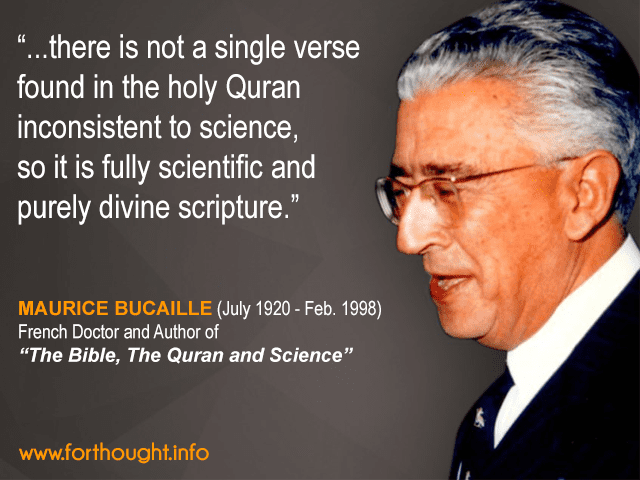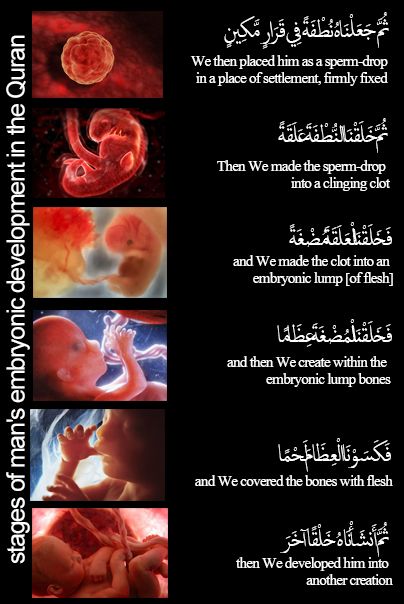When people who aren’t familiar with Islam come across clear evidence, such as the information on pages 4 and 5, showing that Jesus is not God but rather a Prophet of God (pbuh), they often respond by claiming that Prophet Muhammad (pbuh) was a false prophet and that he simply copied the Qur’an from the Bible.
Let’s clear up this misunderstanding by examining three key reasons why the Qur’an could not have been copied from the Bible:
- Category 1: Muhammad himself (pbuh)
- Category 2: A Comparative Study of the Qur’an and the Bible (2 examples).
- Category 3: Scientific facts, discovered only in the 20th century that could already be found in the Qur’an only.
Category 1: Muhammad himself (pbuh):
Muhammad (pbuh) was born in Mecca (570-632); he could not write nor read and spoke only Arabic.
It wasn’t until the 8th century (around 300 years after the passing of Prophet Muhammad (pbuh)) that the first partial translations of the Bible into Arabic were attempted by Syriac-speaking Christians. Then, in the 10th century, Saadia Gaon also partially translated the Hebrew Bible into Arabic. It was only in the 17th century that Sergius Risi, a Catholic Archbishop of Damascus, supervised the translation of the entire Bible (the Old and New Testaments) into Arabic.
So, how could Muhammad (pbuh), who was illiterate and only spoke Arabic, could have copied anything from the Bible?
Category 2: A Comparative Study of the Qur’an and the Bible:
Let’s take a look at a few stories that appear in both the Bible and the Qur’an to see how they compare, keeping in mind that the source is the same “God”.
Example 1: Local vs. Universal Flood during Prophet Noah (pbuh)
The Bible tells of a universal flood during the time of the prophet Noah (pbuh) in the Book of Genesis, Chapter # 7: “Every living thing that moved on the earth perished, birds, livestock, wild animals, all the creatures that swarm over the earth, and all mankind. Everything on dry land that had the breath of life in its nostrils died”.
The Qur’an mentions a local flood affecting the people of Noah only: “Is it too much of a wonder that a reminder should come to you from your Lord, through a man like you, to warn you, and to lead you to righteousness, that you may attain mercy? They rejected him. Consequently, we saved him and those with him in the ark, and we drowned those who rejected our revelations”. (Qur’an 7:63-64)
There is no archaeological evidence to support a global flood occurring at the time described in the Book of Genesis. The closest related event was uncovered in 1929 by archaeologist Sir Charles Leonard Woolley, who discovered evidence of a flood around 4000 B.C. In his book The Bible as History, Werner Keller writes, “A flood of the unimaginable extent described in the Bible remains, as of yet, ‘archaeologically undemonstrated’” (pp. 29-30).
How could the author of the Qur’an have avoided this mistake, unless the revelation came directly from the one who started the flood?
—————————————————————
Example 2: Moses and the Pharaoh:
Another comparison will again demonstrate that the Qur’an was not copied from the Bible.
The Bible states that God drowned the Pharaoh and his army when they pursued Moses (pbuh) and his people: “And the waters returned, and covered the chariots, and the horsemen, and all the host of Pharaoh that came into the sea after them; there remained not so much as one of them” Exodus 14:28.
The clear indication in that description is that the body of the Pharaoh perished in the sea.
The Qur’an agrees that God drowned the Pharaoh and his army when they pursued Moses. However, the Qur’an dared to differ and prove true. In the Qur’an God promised to preserve the body of the Pharaoh after having drowned him as a sign for later generations “…Today, we will preserve your body, to set you up as a lesson for future generations. Unfortunately, many people are totally oblivious to our signs. “(Qur’an 10:90-92).
As God promised in the Qur’an, the Pharaoh’s body was discovered at Thebes in the Valley of the Kings by Loret in 1898. Elliot Smith removed its wrapping on July 8, 1907 and wrote a detailed description in his book The Royal Mummies (1912).
In the late 1970s, the Egyptian president Anwar El-Sadat allowed the loan of the pharaoh’s mummy to Paris to be studied. The Chief Surgeon in charge of the project was Dr. Maurice Bucaille.
Among the discovery made by the scientific team in Paris was the pharaoh’s cause of death: “… The salt remnant in his body was the biggest evidence that he died drowning, and his body was extracted from the sea after drowning immediately. Then quickly they carried and embalming process of the body in order to preserve it…”
Dr. Maurice Bucaille, who was an atheist, was so fascinated by the discovery that he devoted himself to learning the Arabic language in order to be able to read the Qur’an in its original text and to study its meaning.
In 1976, after years of dedicating himself to in-depth study of the Bible and the Qur’an, he wrote a book titled: “The Bible, the Qur’an and Science” which caused a furor in high academic circles, particularly in the Christian world. In his book, Dr. Bucaille aimed to prove that the Qur’an is in agreement with scientific facts, while the Bible is not. He claimed that in Islam, science and religion have always been “twin sisters”. Also and according to Dr. Bucaille, there are monumental errors of science in the Bible and not a single error in the Qur’an, whose descriptions of natural phenomena make it compatible with modern science. Dr. Bucaille concluded that the Qur’an is the reliable word of God and he eventually converted to Islam.

The first modern discovery of mummies was recorded in the 16th century when European travellers and explorers started visiting Egypt. So, how could Muhammad (pbuh) would have known that Pharaoh’s body, which had been dead for centuries, was being preserved in Egypt, especially since mummification wasn’t fully understood until the 19th century, and breakthroughs like CT scans came much later in the mid-20th century? How could Muhammad (pbuh) have predicted that Pharaoh’s body would eventually be found as a sign, especially since this isn’t mentioned in the Bible? Where could he have possibly gotten such knowledge?
—————————————————————–
Category 3: Scientific facts discovered in the 20th century and only found in the Qur’an
We’ve already touched on some fascinating scientific discoveries on page 1 that are uniquely mentioned in the Qur’an, which aren’t found in either the Old or New Testament. For example, the concept of time relativity, the origin of iron on earth came from outer space, and the phenomenon of two seas—one sweet and one salty—that don’t mix. Now, let’s dive a little deeper and explore what the Qur’an says about the stages of human embryonic development.
These details aren’t found in the Old or New Testament either, so how could Muhammad have copied them or known them? After all, he didn’t have access to an MRI or any modern technology to study how the fetus develops.
“We then placed him as a sperm-drop in a place of settlement, firmly fixed. Then We made the sperm-drop into a clinging clot and We made the clot into an embryonic lump (of flesh), and then We create within the embryonic lump bones, and We covered the bones with flesh. Then We developed him into another creation. So blessed is God, the best of creators.” Qur’an 23:12-14

If Muhammad (pbuh) couldn’t have copied the information from the Bible, given that there is no passage describing the stages of human embryonic development, is it possible that he wrote the Qur’an himself? Let’s explore what scientific experts have to say:
Dr. E. Marshall Johnson: Professor Emeritus of Anatomy and Developmental Biology at Thomas Jefferson University, Philadelphia, Pennsylvania, USA:
“The Qur’an describes not only the development of external form, but emphasizes also the internal stages, the stages inside the embryo, of its creation and development, emphasizing major events recognized by contemporary science. I see no evidence for the fact to refute the concept that this individual, Muhammad, had to be developing this information from some place. So I see nothing here in conflict with the concept that divine intervention was involved in what he was able to write.”
Dr. T. Persaud: Professor of Anatomy, Professor of Pediatrics and Child Health, and Professor of Obstetrics, Gynecology, and Reproductive Sciences at the University of Manitoba, Winnipeg, Manitoba, Canada:
“…Muhammad .. could not read, didn’t know how to write. You have someone illiterate making profound pronouncements and amazingly accurate about scientific nature. So many accuracies that I have no difficulty in my mind that this is a divine inspiration or revelation which led him to these statements.”
Dr. Gerald C. Goeringer: Director and Associate Professor of Medical Embryology at the Department of Cell Biology, School of Medicine, Georgetown University, Washington, DC, USA:
“In a relatively few Qur’anic verses is contained a rather comprehensive description of human development from the time of the commingling of the gametes through organogenesis. No such distinct and complete record of human development—such as classification, terminology, and description—existed previously. In most, if not all, instances, this description antedates by many centuries the recording of the various stages of human embryonic and fetal development found in traditional scientific literature”
Dr. Joe Leigh Simpson: Chairman of the Department of Obstetrics and Gynecology, Professor of Obstetrics and Gynecology, and Professor of Molecular and Human Genetics at the Baylor College of Medicine, Houston, Texas, USA:
“I believe that not only is there no conflict between genetics and religion, but in fact, religion can guide science by adding revelation to some traditional scientific approaches. There are also statements in the Qur’an that were shown centuries later to be valid, supporting the idea that the knowledge in the Qur’an was derived from God..”
